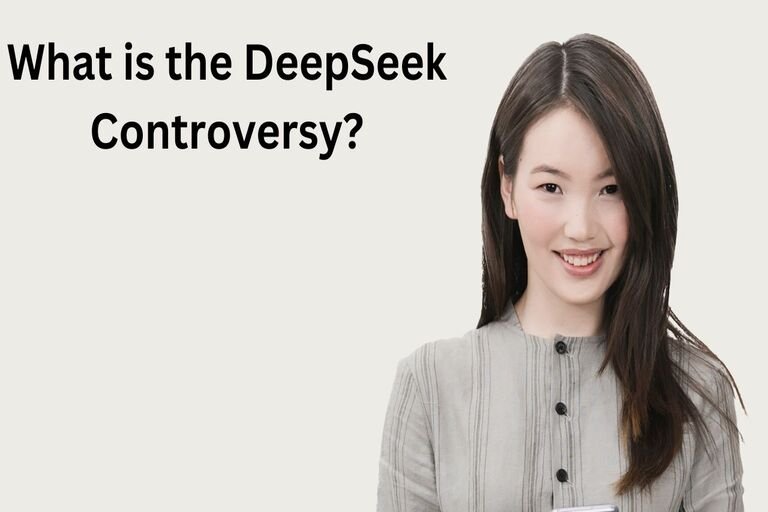DeepSeek controversy stems from the debut of Chinese AI chatbot DeepSeek which has caused major concerns regarding censorship, data privacy issues and potential intellectual property infringement. This article covers key aspects of this debate and its ramifications on global AI landscape.
Background of DeepSeek
What is DeepSeek AI?

DeepSeek, developed in China to compete with leading artificial intelligence models such as OpenAI ChatGPT and Google Gemini, features advanced natural language processing (NLP) capabilities aimed at customer service, content generation and research assistance applications.
Developers and Affiliations
DeepSeek’s financial backing by Chinese tech firms and research institutions raises serious concerns over government influence or oversight over its operations.
Comparison with OpenAI and Google’s AI Models
DeepSeek operates under Chinese regulations that significantly impact its content moderation policies and data management strategies, unlike OpenAI ChatGPT or Google Gemini, significantly altering content moderation policies and handling.
What is the DeepSeek Controversy?
Key Issues Behind the DeepSeek Controversy
1. Censorship and Political Sensitivity
DeepSeek has come under criticism for failing to cover politically contentious subjects, particularly related to China’s territorial disputes or historic events. Some examples are:
- Discussing Tiananmen Square massacre should not be discussed publicly.
- Refusing to answer inquiries regarding Taiwanese sovereignty.
- Dodging responses on Arunachal Pradesh, which is claimed by both India and China.
Concerns have been expressed over AI neutrality and free expression during development.
2. Data Privacy Concerns
DeepSeek has long been under scrutiny due to its data collection practices and privacy regulations, with reports alleging they collect:
- Direct user data includes email addresses, telephone numbers and chat histories of individual users.
- Device information includes IP addresses, keystroke patterns and browsing behavior.
- Third-Party Data: These sources include Apple, Google and analytic firms.
DeepSeek stores its data on Chinese servers, prompting many to worry that this data could be subject to access by China under national security legislation.
DeepSeek’s Alleged Use of OpenAI Data
OpenAI’s Accusations
OpenAI has accused DeepSeek of misappropriating its AI models and datasets in order to train its chatbot, with potential legal repercussions such as intellectual property theft claims if proven.
Impact on AI Ethics

These allegations raise wider ethical considerations regarding AI model training, prompting firms to institute more stringent regulations regarding how AI datasets are developed.
Security Risks and Government Reactions
U.S. and Australian Government Responses
- The U.S. Navy has banned employees from using DeepSeek due to security risks posed by it.
- Australia issued warnings over privacy risks related to citizen use of chatbots.
- Italy’s data protection authority recently demanded more transparency from DeepSeek regarding user data handling practices – actions which reflect worldwide concerns over Chinese AI influence.
Market and Industry Impact
Stock Market Reactions
- DeepSeek’s rise has resulted in significant fluctuations among global tech stocks. To illustrate:
- Nvidia shares fell due to competition from Chinese AI firms.
- Investors are reconsidering market risks associated with AI technology development in China.
Competitive Landscape
DeepSeek’s launch has escalated the battle over AI between Chinese tech titans such as Alibaba and OpenAI as well as Western tech titans such as Google and Microsoft.
Ethical Concerns in DeepSeek’s Development
Algorithmic Bias and Misinformation
Critics allege that DeepSeek’s training data may contain biases favoring Chinese political narratives, raising concerns over misinformation and AI-generated propaganda by watchdog organizations.
Transparency in AI Training Data
DeepSeek stands apart from OpenAI and Google by not publicly disclosing how its model is trained, raising doubts as to its credibility.
User Perspectives and Adoption Trends
Public Perception
- Many users praise DeepSeek’s linguistic accuracy and response speed.
- Others criticize its lack of transparency and tendency to avoid sensitive topics.
- Others criticize its lack of transparency and avoidance of sensitive topics.
Adoption in Different Regions
- China: Due to national regulations that favor local AI models, China AI solutions have seen widespread adoption.
- Western Countries: Due to security and government restrictions, adoption in these nations remains limited.
How DeepSeek Compares to Other AI Models

Future of DeepSeek and Chinese AI Models
Will DeepSeek Face More Bans?
DeepSeek could face more restrictions in Western nations due to heightened government scrutiny.
Potential Policy Changes
DeepSeek may institute more open policies regarding data privacy and content moderation to satisfy its customers’ worries.
China’s Role in Global AI Development
China continues its heavy investments in AI research and development despite this controversy, signalling its ambition of becoming a world leader.
FAQs
Is DeepSeek safe to use?
DeepSeek has generated concerns around data privacy and security for users outside China, who should exercise extreme caution before sharing any personal data with this search engine. Users should take extra caution before disclosing personal information through DeepSeek.
Does DeepSeek collect user information?
DeepSeek collects user data such as personal and device details, device details and keystroke patterns.
Can DeepSeek be used outside China?
Though DeepSeek can be found across numerous regions, several Western governments have placed restrictions or issued warnings about its usage.
What sets DeepSeek apart from ChatGPT?
DeepSeek was developed according to Chinese regulations, leading to restrictions and potential privacy risks compared to ChatGPT.
Has DeepSeek responded to allegations against it?
DeepSeek has generally avoided allegations of data mishandling and censorship; their developers assert that their AI adheres to ethical AI standards.
What are the risks involved with DeepSeek?
Main risks involve violations to data privacy and surveillance concerns as well as government access to stored user data.
Conclusion
DeepSeek’s controversy highlights critical issues regarding AI technologies such as censorship, data privacy concerns and international security risks. While DeepSeek is technologically advanced chatbot, its links with Chinese regulations, lack of transparency, alleged misuse of data collection practices have raised global alarm bells. As AI evolves further regulatory standards will play an essential part in shaping its future use like that seen with DeepSeek.







